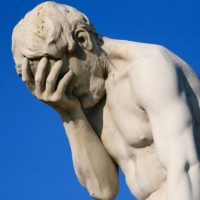It’s our fault when governments use pop media instead of our research
[Image: Caïn by Henri Vidal; photo by Alex E. Proimos CC BY 2.0]
I’m taking a break from reading “The Art Industry And U.S. Policies That Undermine Sanctions” a staff report that was just released by the Permanent Subcommittee on Investigations, United States Senate, to rant a little bit. I’ll be posting about this 150 page investigation on the art market and money laundering soon, but at page 35 I’m already seeing an upsetting pattern.
The writers of this report exclusively cite news media articles and the standard annual art market reports put out by the art fairs and Deloitte. No academic research is cited, at least not yet. The assertions in this text, then, are based on work that is minimally placed within deeper context, is likely not the result of extensive dedicated research, and which is certainly not peer reviewed. Potentially unreliable information, then, gains a governmental stamp of approval, and becomes reality to be (sigh) cited BY academics in their research.
This isn’t the first time that I’ve seen this in a US Govt report focused on art and antiquities matters. Another example: in 2016, the United States House of Representatives Homeland Security Committee put out the report “Cash to Chaos: Dismantling ISIS’ Financial Infrastructure”, which strongly linked the antiquities trade to terrorism financing. The problem was that all but, what, like, one citation led to popular media pieces, which were/are unreliable on the topic to say the least. Meanwhile, a bevy of academics were around to provide better, more nuanced information based on real research. The unreliable media assertions then became “real” because they were in a “legitimate” source, a US Congressional report, and they started to be cited by serious scholars and students…as well as the news media, itself, again. What is reality, anyway?
Academics: THIS IS OUR FAULT. We are completely failing to influence art and heritage policy in these spheres. The people compiling the reports that lawmakers use to make the law WILL NOT READ OUR ACADEMIC PAPERS. They will not use the types of sources that we expect of even our undergraduate students. They will use what is easily available online, giving legitimacy to work that has not passed through any significant vetting for accuracy and integrity.
If we aren’t communicating our work in alternative ways, we have no grounds for moaning when the policy results are poor. If our research is not online in an easy to access, easy to read, easy to understand, consolidated, and concise format, and if we are not proactive about sharing our results with policy makers, our research will not be used to craft better and more effective policy.
Okay, back to reading.
